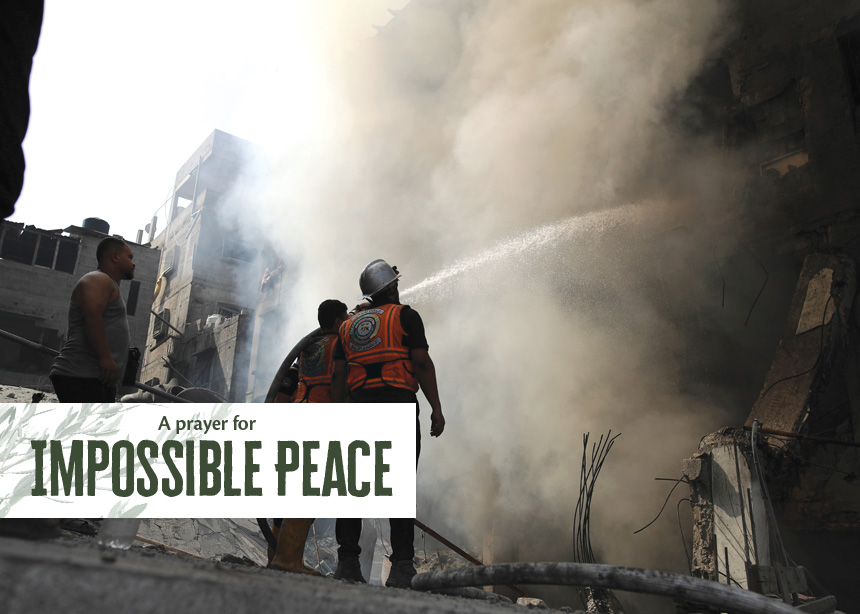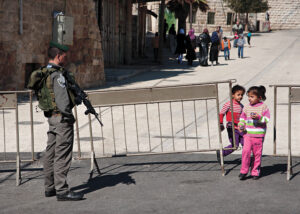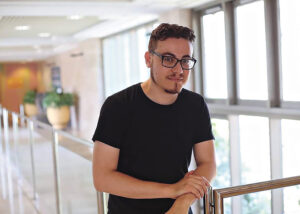The gulf appears impossible to bridge.
As bombs continue to fall onto Gaza and rockets somehow continue to fly out of Gaza, a conflict nearly as old as time and as entrenched as the Jordan River spirals to depths unthinkable. To listen to people on either side is to hear vastly different narratives about the same reality.
The war of hashtags doesn’t help. Vitriol and vilification careen around the globe and our hearts.
Israel appears intent on making Gaza quite unlivable, and Israeli Prime Minister Netanyahu has ruled out any form of Palestinian sovereignty or statehood. Evidence suggests that Hamas would do the same to Israel, or worse, if it could.
According to polls, the tolerance for vengeance and violence in Israel and Palestine is robust, though polls can mislead, and some reports indicate increasing numbers of Israelis now more concerned about the return of hostages than the obliteration of Hamas.
Still, peace could hardly be more distant. That gulf is reflected in our country and our denomination.
I have talked with two respected people in MC Canada churches who expressed deep dismay that the coverage in this magazine fails to adequately acknowledge Jewish realities and deep-rooted Mennonite antisemitism. Fair points.
One questioned the integrity of Mennonites perhaps jumping on a pro-Palestinian bandwagon while ignoring equally urgent concerns elsewhere.
An online commenter said that if Mennonites care so much about people being pushed from their lands, we should actively and tangibly address land concerns of Indigenous people in Canada first. Again, fair point.
How deep and consistent is our commitment to fairness? Are we most vocal when it is most convenient?
Since the Hamas attack of October 7, this magazine has highlighted Palestinian perspectives. Three-plus months in, the more I Iisten to Palestinians—in my case, most notably pastors from the West Bank—and the more I read and listen to material sent to me by readers disgruntled with our Palestinian emphasis, the more compelled I am to take both sides more seriously.
Specifically, I am haunted by the direct challenge of two Palestinian pastors during a December 18 call convened by Mennonite Central Committee. They plead for more than words.
Entirely differently—perhaps impossibly, unthinkably differently—I also feel that for the sake of intellectual and spiritual integrity, I must turn my face toward people who hold narratives I have shied away from. See the interviews with Gustavo Zentner and Richard Marceau of the Centre for Israel and Jewish Affairs.
Also part of this feature section is an article by Madalene Arias about the sobering failure of programs that have brought together Palestinian and Israeli youth over the years. Tea and dialogue are not enough.
To round out the section, Raja Khouri and Jeffrey Wilkinson, writing from a joint Palestinian and Jewish perspective, speak of how absolutist views and absolutist loyalties blunt empathy and justify violence. They talk about how “those of us watching the war unfold from afar tend to be drawn to simple stories that reflect tribal loyalties and communal trauma.”
I suggest that all but the most saintly among us are prone to not only settle too deeply into one narrative or the other, but to allow the taint of vilification into our hearts. I am not immune.
Here lies a tension between holding resolutely to what one believes—as surely we must—and truly seeking the humanity of all. That is, not letting “truth” make us nasty.
When I say I grieve all deaths equally, how true is that?
Would it not be a monumental accomplishment of God’s work in one’s soul to be able to say in full truth that one values all lives equally? That one feels absolutely no hint of satisfaction when one’s foes are dealt a blow?
The path to that goal is long and steep. Each time I turn my face toward the other, I take a step closer. It is a great challenge to open one’s heart to uncomfortable narratives, believing that truth may arise even if one does not agree with the entirety of a particular narrative and that that truth might be more profound than the geo-political arguments of one side or the other.
I am inclined to push the point made by Chimamanda Adichie, the Nigerian novelist and essayist, in her much-watched 2014 Ted Talk, “The danger of the single story.” Her point is simple: no one perspective contains the full truth; we need to do the hard, rewarding work of listening to multiple perspectives.
How far does that extend? Do the stories of a Palestinian pastor who decries Israeli “genocide” and a Jewish person who says the loss of life in Gaza is regrettable in any way complement each other? It feels doubly heretical to even ask the question.
I return, over and over, to the words of Russian novelist Aleksandr Solzhenitsyn, someone whose Gulag prison camp experience brought him in touch with brutality. He wrote: “Gradually it was disclosed to me that the line separating good and evil passes not through states, nor between classes, nor between political parties either, but right through every human heart.”
It’s cliché and annoying to say peace starts within, but if I look at the people who have done much for peace in the world, they are people who have done much inner work.
The great moral leaders denounce and decry, but they do more. Is there not also, always, something in ourselves that we must denounce and resist? Are there not fires within to put out?
Is the work of peace not always the work of nurturing in ourselves and those around us the uncommon capacity to truly see everyone as a child of God? Is that not part of what it means to wrestle with principalities and powers (Ephesians 6)?
Can true peacemaking come from any other place?
Related articles:
Jewish perspectives
Understanding absolutist views
Mideast dialogue programs fall short
Mennonite Action: Arrests at peaceful protest
A modest proposal








Leave a Reply
You must be logged in to post a comment.